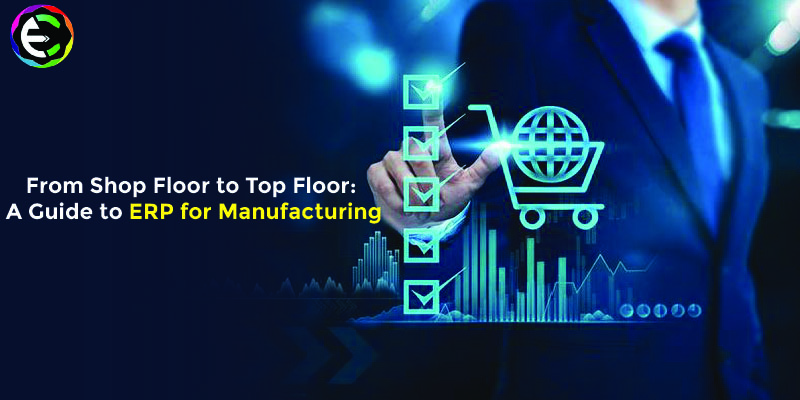ERP for Manufacturing: A Simple Guide for Smarter Workflow

From Shop Floor to Top Floor: A Guide to ERP for Manufacturing
Running a manufacturing business is a big juggling act. You have to keep track of raw materials coming in, machines that need to be running, workers that need schedules, and customer orders that need to go out on time. Trying to manage all of that with a pile of separate spreadsheets or old software is very hard and can lead to some big expensive mistakes. An ERP software for the manufacturing industry is the one central system that connects all of these moving parts together. In this blog, we will go over how ERP software for the manufacturing industry can change the way you work.
Why Does a Manufacturing Business Need a Special ERP?
The biggest problem in a factory that uses disconnected systems is that nobody is on the same page. Your sales team might take an order for a product that your warehouse does not have the raw materials for. Your production floor might not know which job is the most important to run next. This confusion can lead to your ordering the wrong supplies, missing delivery deadlines, and having unhappy customers.
A good manufacturing ERP fixes this by making sure everyone is looking at the same information. It is like a single source of truth for your whole business. When your sales team enters a new order, your production manager sees it right away, and the system automatically checks your inventory to see if you have the parts you need. This keeps your entire operation running smoothly.
What are the Most Important Features for a Manufacturing ERP?
A good ERP for a manufacturer is a set of integrated key tools that are built for the job. Here what are considered as important features for a manufacturer:
Bill of Materials (BOM)
You can think of a Bill of Materials as the “recipe” for making one of your products. It is a list of all the parts and raw materials you need. A good ERP must have a strong bill of materials software feature which lets you easily create and manage these recipes for all of your products.
Production Planning
This part of the software is like the “game plan” for your factory. A good production planning and control software helps you schedule which jobs will run on which machines. It also makes sure that you have all the raw materials you need before you start a production run.
Shop Floor Control
A shop floor control system connects your office to what is actually happening on your factory floor. It can help you track the progress of a job as it moves from one station to the next. This gives you a live view of your production so you always know what is going in and out.
Quality Control
You can also use the ERP to keep track of the quality of your products at every step. The system can help you record the results of your quality checks. This helps you reduce waste and make sure that your customer always gets a good product from you.
How to Get Started with a Manufacturing ERP?
Getting started is a straightforward process:
Map Your Current Workflows
Before you even look at any software, you should first draw out how your factory works right now. Make a list of your biggest problems, like where you are wasting time or materials. This will help you know exactly what you are looking for in a new system.
Choose a System Made for Manufacturers
Do not try to use a generic ERP that is made for a simple retail or trading business. You need a robust ERP software for the manufacturing industry that has the specific tools we talked about, like BOMs and production monitoring.
Work with a Good Partner
Getting your new software set up correctly is a very big step. You should choose a company that can help you install and implement the system successfully. They should also train your employees on how to use it and give you support after it is up and running.
Wrapping Up
A good ERP is like the central brain of a manufacturing business. It connects your sales team, your warehouse, and your factory floor. ERP software for the manufacturing industry gives you the control you need to make better products, faster, and with fewer mistakes. Visit our website to learn more about our manufacturing resource planning software Symphony.
Feel free to contact us at info@erpcrystal.in if you are ready to connect your factory from end to end!
FAQs
Can Our ERP Handle Multiple Warehouse Locations?
Yes, a good manufacturing ERP can track your raw materials and finished goods across many different warehouses. This helps you know exactly what you have in stock and where it is at all times. This is a common need for growing businesses.
How Does It Help Your Sales Team?
Your sales team gets a live view of what is in stock and when new products are scheduled to be finished. This means they can give your customers very accurate delivery dates. They can also see a customer's full order history in one single place.
Is It Hard for Your Employees to Learn How to Use It?
A good ERP system is made to be easy to use. The work flows are usually simple and are designed for the specific job that each person does. A good partner company will also give your team training to help them learn the new system quickly.
Can the ERP Help You Track the Cost of Making Your Products?
Yes, this is one of its most important jobs. It tracks the cost of all your raw materials, the worker time that went into the job, and other machine costs. This shows you the true cost of making each item so you can price it correctly.
What Happens if Your Manufacturing Process Changes?
A good manufacturing ERP is flexible. You can easily update your Bill of Materials (BOM) in the system for a new product version. You can also change the steps in your production process right in the software, so the ERP can change as your business changes.
Book Your Free ERP Demo or Send a Quick Inquiry
Discover how ERP Crystal can simplify your operations. Contact our support team today to get personalized assistance or schedule a live demo.
